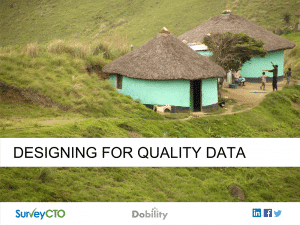What are open source data collection tools, and why are they popular?
Organizations across the globe, especially those involved in non-governmental (NGO) work, international development, and other social impact initiatives, increasingly rely on mobile data collection tools to gather critical information. These tools are instrumental in everything from monitoring and evaluation and gathering real-time data on the ground to enabling informed decision-making that can shape the success of projects aimed at making a meaningful difference in communities.
With many of these organizations being budget-conscious, open source data collection tools have emerged as a popular choice. The allure of open source lies in its promise of no upfront costs, adaptability, and the collaborative spirit of global goods/public goods that thrive on community contributions and shared knowledge. However, this apparent cost-effectiveness can be misleading.
For NGOs and similar entities looking to maximize their resources and efficacy in the field of international development and social goods, here’s a look at why paying for a software as a Service (SaaS) user-funded data collection platform might be a smarter investment.
The real cost of support for open source survey platforms

The foundational principle of open source software (OSS)—that it is freely available for anyone to use, modify, and distribute—resonates with the values of organizations striving to make a difference on a budget. It also offers many benefits that resonate with NGOs and other social impact organizations by fostering community support, transparency, and the flexibility to tailor solutions to specific needs.
However, free survey tools for nonprofits and NGOs can be deceptive, as a variety of hidden costs can accumulate over time, making OSS potentially more expensive and complex to manage than anticipated – and often less cost-effective than paying for a SaaS data collection tool.
When choosing an open source route for data collection, here are some of the hidden costs you might encounter:
- Implementation costs: Deploying open source software and integrating it into an existing tech ecosystem is seldom straightforward. It often requires specialized internal knowledge, and sometimes the hiring of developers. Additionally, the need for custom interfaces to link the open source solution with existing software or data sources can inflate costs, especially when those developer skills are in high demand and expensive to hire.
- Support costs: OSS costs don’t end with implementation. Ongoing maintenance and updates are crucial for keeping any software solution functional and secure. For OSS, this responsibility typically falls on an organization’s internal IT team, or requires outsourcing to specialists. Frequent updates, necessary to keep pace with the evolution of the open source project, can significantly increase the IT workload and costs.
- Security concerns: The nature of OSS means its code is accessible to everyone, including potential attackers. The community-driven model relies on collective vigilance to identify and patch vulnerabilities. However, a lack of resources, expertise, or the complex dependencies on third-party libraries may hamper these efforts and introduce security risks. Open source tools may also not have as robust of security features or meet specific regulatory requirements and standards as SaaS tools.
- Scalability challenges: Many open source projects originate from academic or hobbyist initiatives, designed with limited scalability in mind. This can render them less capable of handling large-scale operations. Within the realm of data collection, many open source tools cap the number of collection responses allowed per month, which also limits scalability.
- Lack of customer support services: Open source platforms often rely on community-based support, which can vary greatly in responsiveness and expertise. This can lead to costly delays in the field as you wait days to get the answers and support you need.
- Lack of future development and customization: Not all OSS projects offer the robust support, comprehensive documentation, and flexibility needed for ongoing innovation and adaptation in an organization’s research or data collection practices. This could potentially lead to a disconnect between organizational needs and software capabilities.
- Not always free: Not all free survey tools for nonprofits remain free. In fact, within the data collection space, several open source tools now require payment for services that were previously free.
Beyond these specific points, organizations might encounter further obstacles, such as integration difficulties with other software, limited user-friendly documentation, and potential incompatibilities with existing hardware or software infrastructure. These factors can lead to increased training costs, user resistance, and ultimately, impact your data collection efforts.
Ways SaaS tools for data collection can save you money and resources

Unlike open source tools, which are freely available for anyone to modify and distribute, SaaS tools typically operate on a user-funded, subscription-based model. Users pay monthly or annually for the use of the tool. This provides an ongoing revenue stream that supports continued development, maintenance, and updates to ensure the software continually meets user needs.
While user-funded SaaS tools aren’t free, they may be more cost-effective in the long run for these reasons:
- Provides a more sustainable approach: A user-funded data collection platform ensures a high-quality, stable, and continuously supported service. This approach guarantees accountability to users, as the platform’s success is intertwined with the success of its users. In contrast, platforms reliant on grant or donor funding may experience funding fluctuations that could lead to support gaps or the demise of the tool. As a user-funded SaaS data collection tool, SurveyCTO ensures consistent service and innovation driven by user needs.
- Designed with users in mind: By focusing on features that provide real value to users instead of catering to external funder demands, user-funded data collection platforms like SurveyCTO can focus on features that offer real value. This user-first strategy not only fosters a more relevant and efficient tool but also guards against the risk of prioritizing innovations that, while appealing to investors or donors, offer limited immediate value to the user base.
- Offers a more advanced feature set: Compared to many open source data collection tools, SaaS tools may have more advanced feature sets because they have consistent funding to develop the tool. In the data collection space, SurveyCTO stands out with its comprehensive set of features, which includes a robust server console for streamlined form design, testing, and data review. Other standout capabilities include advanced offline functionality, including offline case management. This feature, rare among open source platforms, facilitates complex data collection operations directly on the device, even when offline. Additionally, SurveyCTO simplifies data monitoring, and offers intuitive tools for real-time data sharing, which can enhance operational efficiency and decision-making.
- Increased security: The managed nature of SaaS solutions typically means that their data security is more comprehensive and up to date than open source tools. SurveyCTO sets the standard for security within data collection platforms, incorporating top-tier security protocols such as transport encryption, both device and server-side data redundancy, and the option for survey data encryption with keys controlled by the user. This multifaceted approach ensures that sensitive information is accessible exclusively to authorized team members, safeguarding data integrity on SurveyCTO servers. With a professional support team dedicated to research and data collection, the platform offers 24/7 surveillance, consistent software enhancements, and prompt bug resolutions, greatly easing the management and setup process for users. Subscribers are also allocated individual virtual servers, bolstering privacy and security measures. SurveyCTO also offers full GDPR compliance.
- Reduced IT dependency: The SaaS model significantly diminishes the need for internal IT support compared to OSS since the development of the app and infrastructure are provided by the platform. With less IT support required, organizations can allocate their existing IT resources towards more high-value work. In addition, many smaller or mid-size organizations may not possess dedicated IT teams capable of managing the complexities of open-source systems, which can make it even more costly and challenging to source IT resources to help.
- Robust customer support: Unlike many open-source tools, which may lack dedicated support services, SaaS tools like SurveyCTO guarantee its users 24/7 hosting with minimal downtime, alongside continuous backups to ensure data safety and constant accessibility. In addition, SurveyCTO’s Support Center provides global customer service at all hours with an average first response time of under three hours. Such responsiveness is unparalleled in the industry, especially when compared to open-source alternatives, which often depend on community-driven forums and volunteer support. For organizations that prioritize reliable data collection and immediate support for technical issues, having a robust support infrastructure offers peace of mind and ensures operational continuity.
- Accessible data: A key characteristic of global goods, as outlined by the UN, is the emphasis on data accessibility, which aligns with the broader goals of the Sustainable Development Goals (SDGs) through open data and standards. SurveyCTO, while not open source and thus not a global good in the strictest sense, embodies the spirit of this definition by facilitating easy data export and sharing. This capability ensures that data collected via SurveyCTO can be transparently disseminated, mirroring the UN’s vision for accessible information that can drive global progress.
Choose a data collection tool with long-term sustainability in mind

The choice between open source tools and SaaS platforms like SurveyCTO is more than a matter of cost—it’s about value, reliability, and support. While open source solutions offer customization and community support, they fall short in many other areas, such as offering an advanced feature set, comprehensive security and support, and scalability.
Given that the process of changing data collection tools involves substantial disruptions to data collection projects, retraining of field staff, and the logistical challenges of data migration, it’s important to make a sustainable choice from the start, especially for organizations that intend to scale up. For those already using an open source tool, it’s also important to evaluate whether the tool still meets your organization’s needs, because there’s also a significant cost to your overall efficiency and effectiveness for staying with a tool that doesn’t meet your organization’s full needs.
SurveyCTO’s user-funded data collection platform provides a sustainable, secure, and supported pathway for organizations to conduct their research and collect data, especially in offline settings. In addition, SurveyCTO distinguishes itself with its commitment to security, user-focused development, and unparalleled 24/7 global support services, ensuring that organizations can focus on their mission without being bogged down by technical issues or security concerns. Its robust platform capabilities, from case management to robust offline data collection functionality, offer a seamless experience for users. Furthermore, the reduced IT demands enable both small and large organizations to allocate their resources more effectively, ensuring that their projects are not only successful, but scalable.




